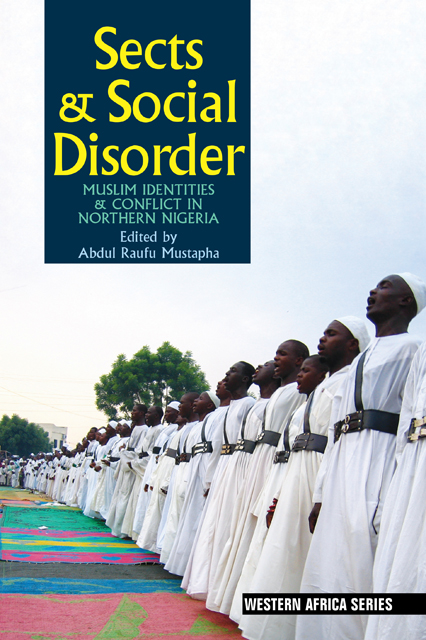Book contents
- Frontmatter
- Dedication
- Contents
- List of Maps, Figures & Tables
- Notes on Contributors
- Foreword by Muhammad Sani Umar
- Acknowledgements
- Glossary
- 1 Introduction: Interpreting Islam: Sufis, Salafists, Shi’ites & Islamists in northern Nigeria
- 2 From dissent to dissidence: The genesis & development of reformist Islamic groups in northern Nigeria
- 3 Contemporary Islamic sects & groups in northern Nigeria
- 4 Experiencing inequality at close range: Almajiri students & Qur’anic schools in Kano
- 5 ‘Marginal Muslims’: Ethnic identity & the Umma in Kano
- 6 Understanding Boko Haram
- 7 Conclusion: Religious sectarianism, poor governance & conflict
- Index
2 - From dissent to dissidence: The genesis & development of reformist Islamic groups in northern Nigeria
Published online by Cambridge University Press: 24 February 2023
- Frontmatter
- Dedication
- Contents
- List of Maps, Figures & Tables
- Notes on Contributors
- Foreword by Muhammad Sani Umar
- Acknowledgements
- Glossary
- 1 Introduction: Interpreting Islam: Sufis, Salafists, Shi’ites & Islamists in northern Nigeria
- 2 From dissent to dissidence: The genesis & development of reformist Islamic groups in northern Nigeria
- 3 Contemporary Islamic sects & groups in northern Nigeria
- 4 Experiencing inequality at close range: Almajiri students & Qur’anic schools in Kano
- 5 ‘Marginal Muslims’: Ethnic identity & the Umma in Kano
- 6 Understanding Boko Haram
- 7 Conclusion: Religious sectarianism, poor governance & conflict
- Index
Summary
Introduction: The ubiquity of dissent
In this chapter I wish to show that the Muslim umma in northern Nigeria has never been without religious dissidence. There is a process to the development of separatist Muslim communities which needs to be studied if Government is to formulate both successful policies of containment and a programme that leads the Government to self-reform: for these ‘extreme’ movements of protest (even Boko Haram) may articulate real concerns, even ideals, at the grass-roots level that it is unwise to ignore. This was true in the past; it is still true today – hence I will briefly re-analyse as an early example the most successful of all northern Nigeria’s religious protest movements, the jihad of the Shaikh ‘Uthman dan Fodio (referred to hereafter as ‘the Shehu’) that lasted four years (April 1804 – December 1808), and led to the establishment of the Sokoto Caliphate, a confederation of emirates that stretched from today’s Burkina Faso in the west to deep into Cameroon in the east; from the edge of the Sahel in the north to the start of the forests six hundred miles to the south. But I will also survey movements that failed, and try to explore the dynamics that underlie violence in the name of religion. In seeking to understand the Muslim opposition to jihad I may be offering readers an unusual, certainly a controversial perspective. I personally think the jihad, and the Caliphate that arose out of it, was one of the most remarkable achievements in the history of Nigeria, if not of Africa. The start of the Sokoto Caliphate in 1804 has not been marked by any Nigerian event of any kind – whether to celebrate the political acumen that made it possible or to analyse and assess the considerable human costs involved on all sides of the violence. This chapter, then, hopes both to provoke the reader and to open eyes onto data that may have been overlooked.
I will start by taking a rather unusual perspective on it by examining the Shehu’s dissident movement through the eyes of the established Muslim authorities.
- Type
- Chapter
- Information
- Sects and Social DisorderMuslim Identities and Conflict in Northern Nigeria, pp. 18 - 53Publisher: Boydell & BrewerPrint publication year: 2014
- 23
- Cited by



